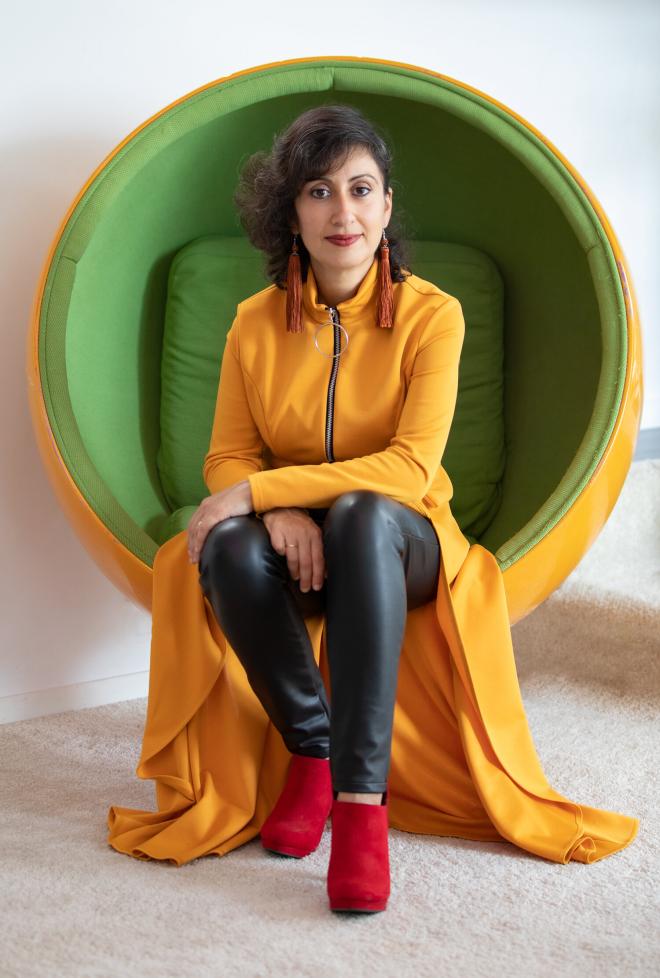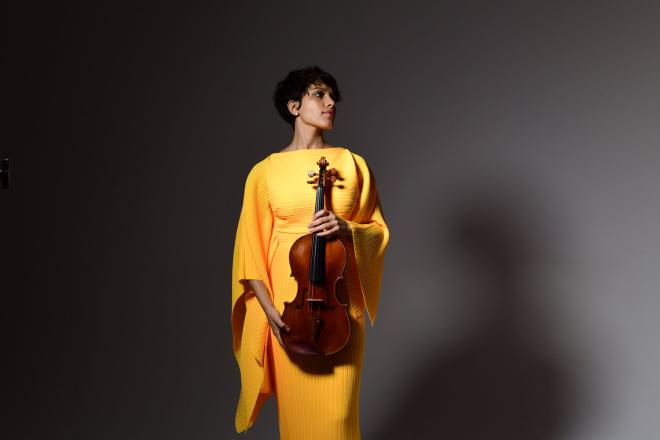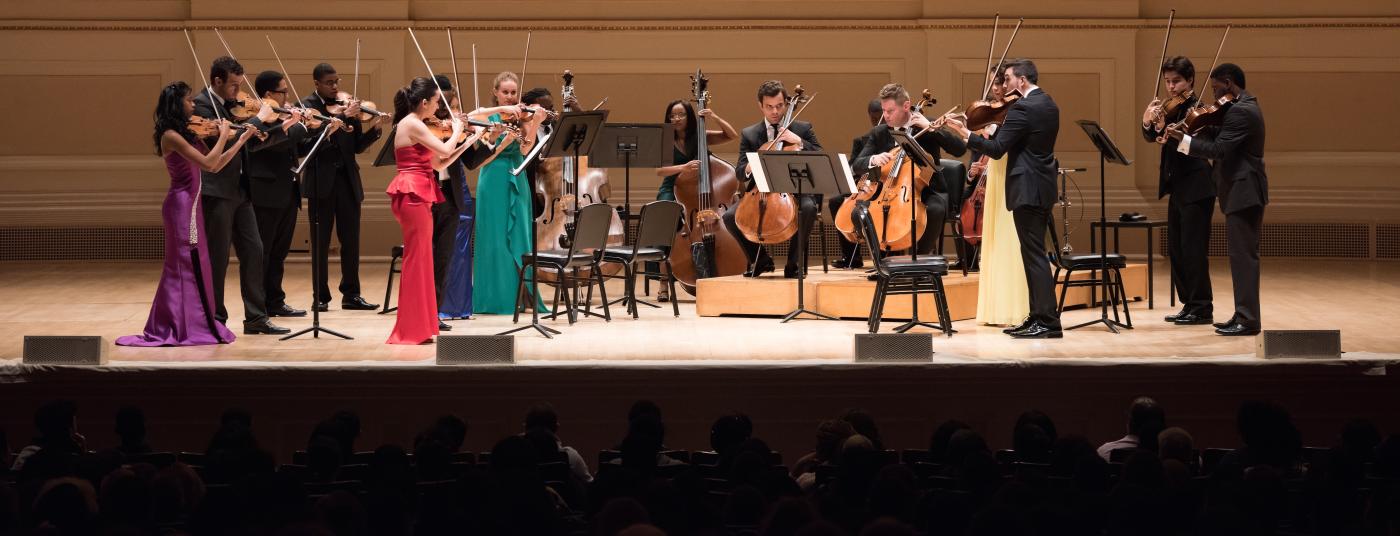The Sphinx Organization is a social justice organization dedicated to transforming lives through the power of diversity in the arts. I’m glad to have had the opportunity to write about them for Classical Score last January; I’m excited to once again explore the fascinating and important work Sphinx is doing as we look forward to a concert “embracing the many voices and sounds that elevate our collective humanity” by the Sphinx Virtuosi on Saturday, October 21, 2023 in Takoma Park, Maryland, a program that is part of the Anna H. Wang Concert Series. The concert program is entitled “Generations”.
Comprised of eighteen accomplished Black and Latinx artists, a critical aim of the Sphinx Virtuosi is to evolve and transform the face of classical music through artistic excellence, pioneering programming, and impassioned community engagement. Sphinx Virtuosi concerts give prominence to historically excluded Black and Latinx composers such as Samuel Coleridge-Taylor, Florence Price, and George Walker. In an effort to expand its repertoire and engage new audiences, the ensemble commissions new works annually; commissions have included new works from Michael Abels, Terence Blanchard, Valerie Coleman, Jimmy Lopez, Jessie Montgomery, Daniel Bernard Roumain, and Carlos Simon.
The October 21 “Generations” program in Takoma Park, inspired by the poetry of Julia Alvarez and Langston Hughes, seeks “to uplift spirits through sharing the sounds that inspire us and transcend the boundaries of time, history, and struggle.” It includes four new works, commissioned by the Sphinx Virtuosi, by Quenton Xavier Blache, Javier Farias, Andrea Casarrubios and Xavier Foley, as well as works by Coleridge-Taylor Perkinson (1932-2004) and Adolphus Hailstork (b. 1941).
I spoke with Afa S. Dworkin, the Sphinx Organization’s President and Artistic Director since 2015, and Celia Hatton, Principal Viola of Experiential Orchestra, Adjunct Faculty member of Adelphi University, and a violist with the Sphinx Virtuosi.
Evan Keely: The poetry of Julia Alvarez and Langston Hughes inspires and informs this concert program: in particular, it calls to mind lines from Alvarez’s “I, Too, Sing América”:
Ay sí,
it’s my turn
to oh say
what I see,
I'm going to sing America!
And Langston Hughes’s “I, Too”:
Besides,
They’ll see how beautiful I am...
I, too, am America.
How are these lines of poetry present in the music we’ll hear the Sphinx Virtuosi playing?
Afa S. Dworkin: We imagine a journey for our listeners, during which the multitude of sounds, styles and colors reveal a tradition of beauty. Coleridge-Taylor Perkinson is a quintessentially American composer. His timeless music covers generations of sounds we hear, love to listen to and yearn to hear, from his fascination with Bach to his robust and masterful incorporation of jazz and blues into classical. Hailstork’s Sonata da Chiesa is sure to evoke a different stylistic nostalgia through a distinctly American lens. And then there is the genius of Quenton Blache and his jubilant style, contrasted with Andrea’s cantilena style singing from the orchestra. Ultimately, we hope to convey, or share the American classical sound, in its infinite, complex and multidimensional beauty.
EK: Concerts don’t always have titles, but this one does. “Generations” is the title of the Sinfonietta No. 2 by Coleridge-Taylor Perkinson, included on this program. What other ideas, feelings or actions are being generated such that this program appears under the rubric of this singe word?
ASD: We love to curate programs that carry titles, which are meant as a suggested source from which our collective artistic aspirations assemble for each season. Similar to Perkinson’s reflection of familial generations, we speak to generations of American composers who have exhibited artistic excellence over the years and helped to shape the sound and the aesthetic of American classical music.
EK: This concert consists of six works, four of which are new pieces composed for the Sphinx Virtuosi by Quenton Xavier Blache, Andrea Casarrubios, Javier Farias and Xavier Foley. What relationships do these composers have with the Sphinx Organization, and what does their being represented on this particular program signify?
ASD: Each individual shares their unique connection. Xavier is one of the winners of the Sphinx Competition and someone who has worked with the ensemble several times as a bassist and composer. Quenton is a member of the Virtuosi and the Sphinx Competition alumni family, and we are now proudly presenting his compositional gift, as well. We have worked with Andrea over the years, and for Xavier, this work marks our inaugural collaboration.
EK: Celia Hatton, you’ve played in the Metropolitan Opera Orchestra and the St. Paul Chamber Orchestra, and you’ve toured with The Knights and the Orpheus Chamber Orchestra, to name just a few; you’ve also performed at the Apollo Theatre, the Blue Note, Birdland, and with Jazz at Lincoln Center; Paquito D’Rivera, Mark Gross and Terry Slingbaum have collaborated with you. Please tell us how being one of the Sphinx Virtuosi is informed by these diverse experiences and accomplishments of yours.
Celia Hatton: Performing in different settings has allowed me to bear witness to inspirational musical landmarks — whether a mesmerizing bass clarinet solo in the opera pit, a backstand violinist shining bright, or a synthesizer solo in an underground NYC club taking groove to a new world. The four commissions on Sphinx Virtuosi’s pull from a wide range of influences. Embracing the musical world holistically has helped enrich my understanding of commissions and older, lesser known works. I also love how performing in a self-conducted ensemble demands that I bring an informed and personal interpretation to the stage. Everything is connected!
EK: Afa Dworkin, this past April, you made remarks in a segment on CANVAS, the arts and culture series on the PBS News Hour — comments that were altogether in line with what you have been saying for years, and which are certainly representative of the core mission of the Sphinx Organization: that diverse representation in classical music “it is existentially important”:
If orchestras wish to envision themselves as thriving today and five and ten years from now, they ought to think about their audiences. And they ought to think about who comprises the artistic collective that performs on the stage, and why it is important for that artistic collective to, in fact, reflect the community and be relevant to the community.
How does the “Generations” concert square with this mission and vision?
ASD: Generations is a living and breathing manifestation of that sentiment/credo. We hope that this beloved art form of ours retains its relevance to our communities. We hope that the beauty of these voices is heard and experienced by our traditional concertgoers and new audiences alike. To do so, we hope to program in a manner that strives to nourish that sense of relevance, urgency, duty, and commitment to ensure that what we perform is as rich and full as the diversity inherent in our communities.
EK: Can you both say something that you want to make sure our Classical Score readers know about this “Generations” concert?
ASD: I am sure Celia might agree that our collective labor of love, Songs for Our Times, our debut album on the Deutsche Grammophon label, is a perfect pre-companion for our audiences coming to hear Generations (available on all major platforms).
CH: The Tacoma Park concert will be our 10th performance on tour. After hours of rehearsal and traveling throughout the US together, there is a genuine bond on stage that I hope the audience can feel too. Also, our new album is worth a listen or two, or ten…
PBS PASSPORT
Stream tens of thousands of hours of your PBS and local favorites with WETA+ and PBS Passport whenever and wherever you want. Catch up on a single episode or binge-watch full seasons before they air on TV.


